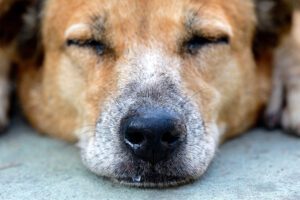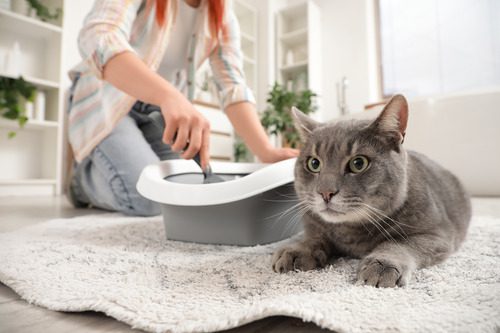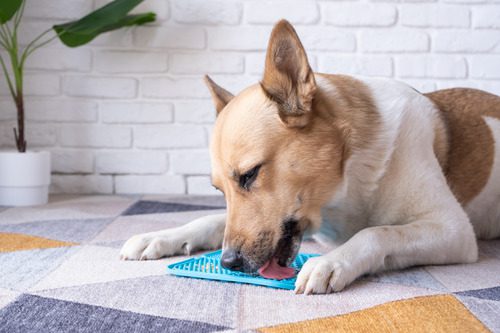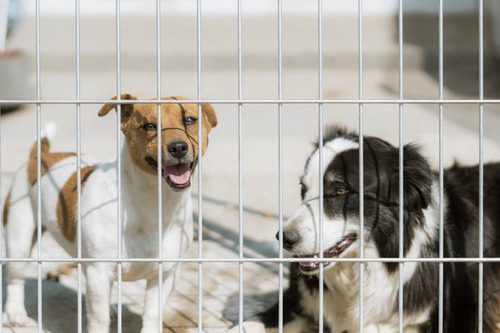Understanding and Treating Runny Noses in Dogs
Does your dog have the sniffles? This isn’t an uncommon occurrence, but understanding the underlying causes of a dog’s runny nose plays an important role in providing them with proper care. In this blog, we’ll explore the various factors that may contribute to runny noses in dogs, additional symptoms to look out for, and possible effective treatments.
If you’re concerned about your dog’s runny nose, don’t hesitate to call Best Friends Veterinary Hospital for expert advice and care.

What are Some Common Causes of Runny Noses in Dogs?
A runny nose in your dog can be more than just a minor nuisance; it might be a sign of an underlying health issue. It’s essential to understand the various causes that can lead to this condition so you can take the appropriate action to treat your pet if needed.
In this section, we’ll delve into the common reasons for nasal discharge in dogs, which can range from environmental allergens to more serious health concerns. Each of these causes requires a different approach to diagnosis and treatment. Being aware of these factors can help you take better care of your pet and decide when it’s time to seek professional help from Best Friends Veterinary Hospital Crossville.
Allergies in Dogs
Allergies are one of the most common causes of a runny nose in dogs. This can be triggered by environmental allergens such as pollen, dust, mold, or even certain foods. Symptoms of allergies in dogs include constant sneezing, itching, watery eyes, and nasal discharge. If you notice your dog showing these signs, especially during certain times of the year or after being in specific environments, it could indicate an allergic reaction. Allergy testing and management strategies, including possible dietary changes and environmental modifications, can be discussed with your veterinarian.
Upper Respiratory Infections
Similar to humans, dogs can suffer from colds and other respiratory infections. These infections are usually caused by viruses or bacteria and can lead to symptoms such as a runny nose, coughing, sneezing, lethargy, and sometimes fever. If your dog shows signs of an upper respiratory infection, it’s important to keep them comfortable and consider a veterinary consultation, especially if symptoms persist or worsen. In some cases, antibiotics or other medications may be prescribed to help combat the infection.
Irritants and Chemical Exposure
Dogs have sensitive noses, and exposure to various irritants like cigarette smoke, strong fragrances, household cleaning agents, or even air pollution can cause a runny nose. If you notice your dog’s runny nose is often accompanied by sneezing or coughing, it’s worth evaluating their environment for potential irritants. Reducing exposure to these substances can help alleviate symptoms. In cases of severe reactions, you should seek veterinary advice right away.
Foreign Objects in the Nasal Passages
Sometimes, a dog’s runny nose can be due to a foreign object being lodged in their nasal passage. Dogs are curious creatures and can accidentally inhale small objects during play or while sniffing around. Signs that might indicate a foreign object in the nasal passage include pawing at the nose, sneezing, bleeding from the nose, and unilateral (one-sided) discharge. If you suspect your dog has inhaled a foreign object, it’s essential to seek veterinary care immediately. Do not attempt to remove the object yourself, as this could cause further harm.
Diagnosing and Treating Runny Noses in Dogs
When your dog is experiencing a runny nose, it’s not just about managing the symptom but about addressing the root cause, as well. Professional veterinary care is essential in determining the underlying issue and providing the appropriate treatment so your pet can recover. At Best Friends Veterinary Hospital Crossville, we’re committed to offering the best care for your pet. Let’s explore the various treatment options available for canine nasal discharge.
Diagnosing a runny nose in dogs involves a comprehensive approach, as there are multiple potential causes. Veterinarians typically use a combination of clinical examination, history-taking, and diagnostic tests.
Here’s how the process generally unfolds:
Clinical History and Examination
- History-Taking: Your vet will ask about your dog’s symptoms, their duration, and any possible triggers or changes in the environment. Details about your dog’s diet, lifestyle, recent activities, and any known allergies are also crucial.
- Physical Examination: Your vet will perform a thorough physical examination of your dog, focusing on the nasal area. They will look for signs of discharge, inflammation, asymmetry, or any other issues. The examination may also include checking your dog’s temperature and assessing overall health to identify signs of systemic illness.
Diagnostic Testing
- Nasal Swabs: To check for infections, your vet may take nasal swabs. These swabs can help us identify bacteria, fungi, or viruses causing the nasal discharge.
- Blood Tests: Blood tests can be useful in assessing your dog’s overall health and can help us rule out systemic conditions that might cause nasal discharge, such as autoimmune diseases.
- Allergy Testing: If we suspect allergies, we might recommend conducting an allergy test. This can include skin testing or blood tests to identify specific allergens.
- Imaging: In some rare cases, imaging studies such as X-rays, CT scans, or MRIs might be required. These are particularly useful if a foreign body is suspected or to assess the structure of the nasal passages and sinuses for anything unusual.
- Rhinoscopy: A rhinoscopy, where a small camera is inserted into the nasal passages, can be performed to look for foreign objects, tumors, polyps, or other abnormalities.
- Biopsy: If there’s a suspicion of a tumor or a chronic infection, a biopsy of the nasal tissue may be recommended for doing further analysis.
Review Environmental Factors
- Your vet may also inquire about environmental factors such as exposure to smoke, chemicals, or other irritants that could contribute to a runny nose.
Once the diagnosis is made, your veterinarian can then recommend an appropriate course of treatment. This might include medications, environmental modifications, dietary changes, or, in some cases, surgical intervention. The key is a tailored approach based on the specific cause of your dog’s runny nose.
Preventative Measures and Health Checkups
Preventing runny noses in dogs often involves a combination of good health practices, environmental management, and regular veterinary care.
Here are some measures you can take:
Maintain a Clean Environment
- Regularly clean your home to reduce dust, dander, and other potential allergens.
- Use pet-friendly cleaning products to minimize exposure to harsh chemicals that can irritate your dog’s nasal passages.
Manage Allergens
- If your dog has known allergies, try to minimize exposure to these allergens. This can include using air purifiers, hypoallergenic bedding, and avoiding areas with high pollen during allergy seasons.
- Regular bathing and grooming can help remove allergens from your dog’s fur and skin.
Avoid Smoke and Strong Fragrances
- Keep your dog away from cigarette smoke, strong perfumes, and other strong odors that can irritate their nose.
Balanced Diet and Hydration
- Ensure your dog has a balanced diet to support their overall health and immune system.
- Provide constant access to clean water to help keep their mucous membranes moist and better able to trap and expel irritants.
Regular Exercise and Healthy Weight
- Regular exercise helps maintain a healthy immune system.
- Keeping your dog at a healthy weight reduces the risk of health issues that might contribute to nasal problems.
Routine Veterinary Checkups
- Regular vet visits are crucial for early detection and prevention of health issues that could cause a runny nose.
- Keep up with vaccinations and parasite prevention, as these can protect against certain infections that might cause nasal discharge.
Monitor for Foreign Objects
- Keep an eye on your dog during play, especially in areas where they might encounter small objects or debris they could inhale.
By following these preventative measures, you can help reduce the likelihood of your dog developing a runny nose. Still, it’s important to remember that if your dog does experience persistent nasal discharge, it’s best to consult a veterinarian for proper diagnosis and treatment. For personalized advice or to schedule an appointment, call Best Friends Veterinary Hospital!
Recent Posts
About Best Friends Veterinary Hospital
Our veterinarians and staff warmly welcome dogs, cats, and a variety of exotic pets as patients here at our animal hospital, and we offer a host of services to give your unique family member a lifetime of excellent care.





